Related Research Articles

Andrew Jackson Young Jr. is an American politician, diplomat, and activist. Beginning his career as a pastor, Young was an early leader in the civil rights movement, serving as executive director of the Southern Christian Leadership Conference (SCLC) and a close confidant to Martin Luther King Jr. Young later became active in politics, serving as a U.S. Congressman from Georgia, United States Ambassador to the United Nations in the Carter Administration, and 55th Mayor of Atlanta. He was the first African American elected to Congress from Georgia since Reconstruction, as well as one of the first two African Americans elected to Congress from the former Confederacy since Reconstruction, alongside Barbara Jordan of Texas. Since leaving office, Young has founded or served in many organizations working on issues of public policy and political lobbying.

Stephen Lisle Carter is an American legal scholar who serves as the William Nelson Cromwell Professor of Law at Yale Law School. He writes on legal and social issues.

Morehouse College is a private historically Black, men's, liberal arts college in Atlanta, Georgia. Anchored by its main campus of 61 acres (25 ha) near Downtown Atlanta, the college has a variety of residential dorms and academic buildings east of Ashview Heights. Along with Spelman College, Clark Atlanta University, and the Morehouse School of Medicine, the college is a member of the Atlanta University Center consortium.

The University of the District of Columbia (UDC) is a public historically black land-grant university in Washington, D.C. It was established in 1851 and is the only public university in the city. UDC is a member school of the Thurgood Marshall College Fund. The full university system offers workforce and certificate programs in addition to Associate, Baccalaureate, Master's, professional, and Doctoral degrees. The university's academic schools and programs include the UDC Community College, College of Arts and Sciences, School of Engineering and Applied Sciences, School of Business and Public Administration, Colleges of Agriculture, Urban Sustainability & Environmental Sciences, and David A. Clarke School of Law.

Vernon Eulion Jordan Jr. was an American business executive and civil rights attorney who worked for various civil rights movement organizations before becoming a close advisor to President Bill Clinton.

Whitney Moore Young Jr. was an American civil rights leader. Trained as a social worker, he spent most of his career working to end employment discrimination in the United States and turning the National Urban League from a relatively passive civil rights organization into one that aggressively worked for equitable access to socioeconomic opportunity for the historically disenfranchised. Young was influential in the United States federal government's War on Poverty in the 1960s.

Benjamin Elijah Mays was an American Baptist minister and American rights leader who is credited with laying the intellectual foundations of the American civil rights movement. Mays taught and mentored many influential activists, including Martin Luther King Jr, Julian Bond, Maynard Jackson, and Donn Clendenon, among others. His rhetoric and intellectual pursuits focused on Black self-determination. Mays' commitment to social justice through nonviolence and civil resistance were cultivated from his youth through the lessons imbibed from his parents and eldest sister. The peak of his public influence coincided with his nearly three-decade tenure as the sixth president of Morehouse College, a historically black institution of higher learning, in Atlanta, Georgia.

Joseph Anthony Califano Jr. is an American attorney, professor, and public servant. He is known for the roles he played in shaping welfare policies in the cabinets of Presidents Lyndon B. Johnson and Jimmy Carter and for serving as United States Secretary of Health, Education, and Welfare in the Carter administration. He is also the founder and chairman of The National Center on Addiction and Substance Abuse at Columbia University (CASAColumbia), an evidence-based research organization, which is now the Partnership to End Addiction, where Califano holds the title of Chair Emeritus.
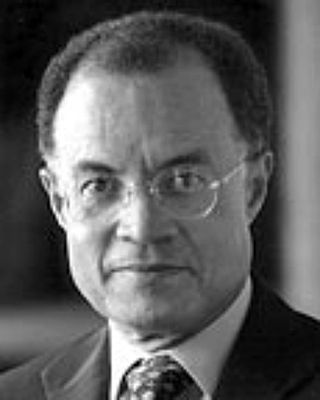
Drew Saunders Days III was an American legal scholar who served as Solicitor General of the United States from 1993 to 1996 under President Bill Clinton. He also served as the first African American Assistant Attorney General for the Civil Rights Division in the Carter Administration from 1977 to 1980. He was the Alfred M. Rankin Professor of Law at Yale Law School, assuming that post in 1992, and joining the Yale Law faculty in 1981. From 1997 to 2011, he headed the Supreme Court and appellate practice at Morrison & Foerster LLP and was of counsel at the firm's Washington, D.C. office until his retirement from the firm in December, 2011. He earned his Juris Doctor degree at Yale Law School in 1966. He was admitted to practice law before the United States Supreme Court, and in the states of Illinois and New York.
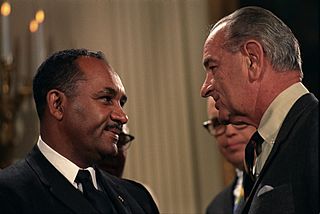
Clarence Maurice Mitchell Jr. was an American civil rights activist and was the chief lobbyist for the NAACP for nearly 30 years. He also served as a regional director for the organization.

Eunice Roberta Hunton Carter was an American lawyer. She was one of New York's first female African-American lawyers and one of the first African-American prosecutors in the United States. She was active in the Pan-African Congress and in United Nations committees to advance the status of women in the world. She led a massive prostitution racketeering investigation, building the case and strategy that allowed New York District Attorney Thomas Dewey to successfully charge Mafioso kingpin Charles "Lucky" Luciano with compulsory prostitution.
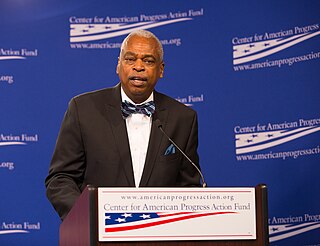
Wade J. Henderson is an African-American advocate, community leader and governmental activist. He has served as president of the Leadership Conference on Civil and Human Rights (LCCHR) and counsel to the Leadership Conference Education Fund.

William Tapley Bennett Jr. was an American diplomat who served as Ambassador to the Dominican Republic during the 1965 civil war and who recommended that President Johnson intervene with United States troops.
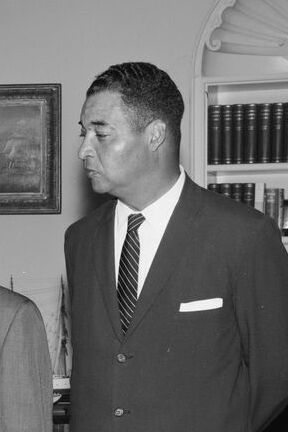
Louis Emanuel Martin Jr. was an American journalist, newspaper publisher, civil rights activist and advisor to three presidents of the United States. Through his political activism during the civil rights era, he came to be known as the "Godfather of Black Politics."
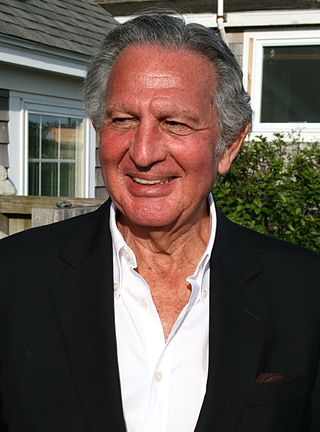
Lester S. Hyman is an American attorney and writer who was a founding partner of law firm Swidler Berlin.
The Kettering Foundation is an American non-partisan research foundation founded in 1927 by Charles F. Kettering that works to inspire and connect individuals and organizations to advance thriving and inclusive democracies around the globe. The foundation believes that "all people belong and have the right to engage in and shape a democracy that serves them."
Jesse Hill Jr. was an African American civil rights activist. He was active in the civic and business communities of the city for more than five decades. Hill was president and chief executive officer of the Atlanta Life Insurance Company, from 1973 to 1992, and was the first African American to be elected president of a chamber of commerce in a major city. During Hill's presidency of the Atlanta Life Insurance Company it became the largest black-owned life insurance company in the nation. He was a member of the board of directors for the 1996 Summer Olympics in Atlanta.
William C. Pryor was a judge of the District of Columbia Court of Appeals, the highest court for the District of Columbia. He was the court's second African-American chief judge, serving from 1984 to 1988.
Ronald Francis Mason Jr. is an American lawyer and university administrator, serving as the ninth president of the University of the District of Columbia (UDC). He took office in July 2015. This is Mason's third presidential appointment. He was previously chief executive officer at the Southern University System of Louisiana (2010-2015) and Jackson State University (2000-2010). Before his administration at Jackson State, Mason held several executive appointments over a 17-year tenure at Tulane University, including general counsel, vice president for Finance and Operations and senior vice president and general counsel.
References
- ↑ "Carter, Lisle C. – Notable Black American Men, Book II | Encyclopedia.com". www.encyclopedia.com. Retrieved 2016-02-22.
- ↑ "Obit: Lisle Carleton Carter Jr. '45". Dartmouth Alumni News. March–April 2010. Retrieved 2017-04-16.
- ↑ "Lisle Carter up for Atlanta U High Post". Jet. XLIV (23). Johnson Publishing Company: 7. August 30, 1973. Retrieved 2017-04-16.
- ↑ PRC mourns the death of a longtime board member, Pension Rights Center. September 25, 2009. Accessed 2017-04-16. Archived 2021-11-20 at the Wayback Machine .